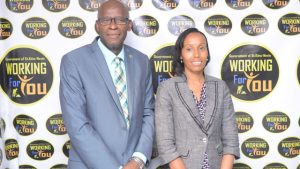 Permanent Secretary in the Ministry of Education, William V. Hodge, said that the education system in St. Kitts and Nevis, as well as other parts of the Caribbean, is undergoing a number of changes geared towards ensuring that every child is given a sound education.
Permanent Secretary in the Ministry of Education, William V. Hodge, said that the education system in St. Kitts and Nevis, as well as other parts of the Caribbean, is undergoing a number of changes geared towards ensuring that every child is given a sound education.
“We in St. Kitts and Nevis are beginning to unfold a Technical and Vocational Education and Training (TVET) project. The Caribbean Development Bank (CDB) has given us part loan, part grant, to work on improving the TVET subjects in our secondary school and at the tertiary level, and when that begins to roll out it is going to definitely transform the phase of education in St. Kitts and Nevis,” said Mr. Hodge, during his appearance on “Working for You” on Wednesday, July 05. “Part of it is going to be physical expansion of our secondary schools to provide for the skill areas [such as] plumbing, carpentry, masonry and all those technical skills that we are definitely going to need to move our country forward in terms of tourism and even for our own country development.”
The permanent secretary further stated that the ministry has started looking for teachers and other interested persons to train them in the above mentioned areas.
“We are offering scholarships to go to do degrees and other levels of qualification. So we are moving forward. There are changes that would come with the expansion of the TVET Programme in schools,” he said.
Dr. Tricia Esdaille, Chief Education Officer (CEO) in the Ministry of Education, touched on another change that the education system has gone through where students are now studying subjects according to their interests.
“If a student has an interest in the Sciences they can focus heavily in the sciences. If a students has interest in Mathematics they can [branch] off in the area. So this idea that students are restricted to this purely academic course of study is long gone,” said Dr. Esdaille, while challenging the idea of academic versus non-academic. “All forms of study are academic… when we talk about TVET, it is academic, and it is applied. You take Mathematics and you create something. So you can study Mathematics as pure Math and that might be seen as academic, but when I build, construct or wire something – that is Chemistry, that is Physics, that is Mathematics. So, I think that culturally, we need to have a shift in how we view education.”
